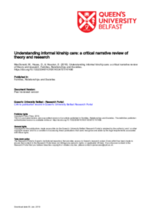Creating a Kin-First Culture
This article from the Child Law Practice Today July/August 2017 Issue on Kinship Care summarizes seven steps to create a kin-first culture—one in which child welfare stakeholders consistently promote kinship placement, help children in foster care maintain connections with their families, and tailor services and supports to the needs of kinship foster families.

